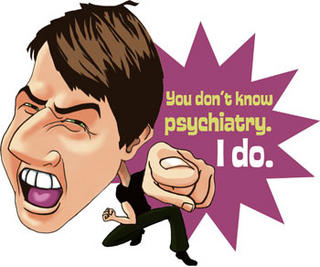Tom Cruise is Nuts! Or, Scientology vs. Psychiatry

I have a treat for you loyal band of readers! Check out this website: TomCruiseIsNuts.com
I stumbled upon this last night after reading a very interesting four part series over at Salon.com on Scientology.
I have been avoiding blogging about Tom Cruise's crusade against ADHD medications and Psychiatry for awhile. I guess, like Shankar Vedantam at the Washington Post, I just didn't think it deserved my attention (he said this in an online chat with people who read his three part series on Psychiatry and Cultural Differences). However, as I read on in Healy's book about the "unhealthy relationship between the pharmaceutical industry and depression," I cannot ignore the extremely dangerous influence Scientology has had on psychopharmacologists and psychiatrists. Healy basically argues that one of the reasons why psychiatrists defended Eli Lilly from attacks that Prozac might cause suicide is because they hated the Scientologists so much that they would rather be in bed with the pharmaceutical industry.
" . . . I launched into the influence of the Scientologists on the whole Prozac controversy. If they hadn't intervened, U.S. psychiatry wouldn't have stood behind Lilly the way it did." (Healy 2004, 138)
Healy also explains the strategy that the pharmaceutical industry and the American Psychiatric Association adopted to simultaneously discredit (a) crictisms that Prozac may cause suicidiality and (b) the whole Scientologist movement against Psychiatry in general.
"In 1994, the American Psychiatric Association Press published the book Psychiatric Practice Under Fire. The first chapter dealt with the Scientologists' attack on
Prozac. Other chapters outlined the attack on ECT, the emerging problems posed
by managed care, attacks on the benzodiazepines, and the negative influence of
excessive bureaucracy and regulation in general. The Prozac chapter, written by
Rosenbaum from Massachusettes General, took a by now standard approach,
castigating the Scientologists. There were three messages. First, Prozac was the
most researched drug in history. Second, the problem was the disease, not the
drug. And third, the real tragedy of the Prozac story lay in all the people who
would commit suicide because they were being denied access to an effective
treatment. The three assertions were becoming the chorus lines in the
background of the Prozac story." (Healy 2004, 59).
What is becoming clear to me is that extreme positions against biological psychiatry, such as Tom Cruise's recent outbursts and condemnation of Brooke Shields, totally shuts down productive criticism of psychiatric diagnosis, nosology, and the overmedicating of women and children. One can be suspicious of alot of things about the DSM, for example. The diagnoses are culled from clinical observations, not from underlying pathologies. Moreover, the advent of SSRI drugs, such as Prozac, with their low side effects has enabled more and more general practitioners to prescribe the drug without a lot of follow up. I could go on and on. But, what happens when critics such as Scientologists go after psychiatry is that psychiatrists consolidate behind biological psychiatry and psychopharmacology. To criticize the trend toward biological psychiatry is to sound like a frickin scientologist, and no one wants to be lumped in that category.
This is not good. When you have an enemy as annoying and looney as Cruise, then it becomes very important to distance yourself and your criticisms as much as possible from him. The downside, as Healy points out, is that psychiatrists and psychopharmacologists were not critical enough in analyzing the data that Prozac might cause suicide in patients who had no prior suicidal tendencies or even episodes of depression. So, now, if you want to criticize biological psychiatry, you end up sounding like one of those wacko, pseudo-scientific Dianetics-reading folks. As my very smart colleague pointed out, we are left with false alternatives: either you are a Scientologist or you uphold biological psychiatry as a rigorous science.


|